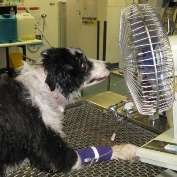Perth's extreme heat wave is likely to put pet lives in jeopardy, with dogs at the biggest risk of suffering health dangers such as heatstroke according to leading veterinary doctors.
"We have already seen dogs this year that have died from being left in the car," said Dr Griffiths from the Murdoch Pet Emergency Centre (MPEC).
With an outside temperature of just 30C, the inside temperature of a car reaches 65oC within 5 minutes and 78C within 15 minutes. Even with a 5 cm window gap, the temperature can still be 70C within 15 minutes. These temperatures kill.
"Heatstroke can occur very quickly, if dogs are outside on a hot day with no shade, or if they are left in a car, even with the windows down. We also see it after dogs have been exercising on hot days. Unfortunately, even running around at the beach, in and out of water, can cause heatstroke. Heatstroke kills," added Dr Griffiths.
"Dogs don't have an "off switch", and they can become so engrossed in the game and the fun they are having that they will over-exercise to the point of causing heatstroke."
Dogs can't sweat, so they lose heat by panting. On humid days, it is more difficult for them to lose heat as evaporation is not as effective. Panting is also an active process, in that it takes muscle activity to pant, so the muscles generate heat in order to lose heat. This means that dogs are very prone to heatstroke.
"If you have left your pet in the car or they have become too hot for any reason, cool them down by wetting them with cool or tepid water, such as from a hose. Do not wrap them in wet towels or use ice water or ice packs," said Dr Griffiths.
"Drive to the vet with the air conditioning on full or the windows down – even mild heatstroke is an emergency. Treatment of heatstroke is intensive and difficult, and the sooner it is started the better."
MPEC is open 24 hours a day, 7 days a week, and staff are always available should you have any concerns about your pet. MPEC can be contacted on 1300 652 494.
Top tips on prevention of heatstroke involve:
- Keeping your pets inside and preferably in air conditioning
- Do not exercise them during daylight hours.
- Take dogs for short slow walks. Do not encourage them to run or chase eg playing ball is not recommended.
- Pets that are overweight, short faced or have pre-existing heart or breathing problems are at increased risk and should not be outside during daylight hours.
- Give them plenty of fresh water and shade, and allow them to snooze away the hot days in a cool place.
Provided by Murdoch University






















